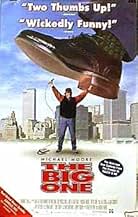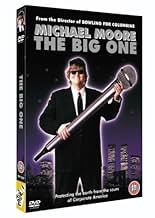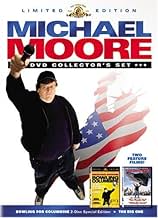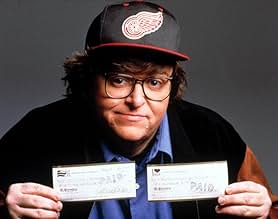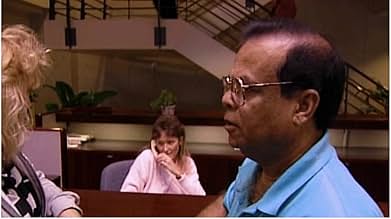AVALIAÇÃO DA IMDb
7,1/10
8,1 mil
SUA AVALIAÇÃO
Adicionar um enredo no seu idiomaOn his book tour, Michael Moore exposes wrongdoing by big greedy businesses and callous politicians around America.On his book tour, Michael Moore exposes wrongdoing by big greedy businesses and callous politicians around America.On his book tour, Michael Moore exposes wrongdoing by big greedy businesses and callous politicians around America.
- Direção
- Roteirista
- Artistas
- Prêmios
- 6 vitórias no total
Bill Clinton
- Self - Presidential Candidate
- (cenas de arquivo)
Jim Czarnecki
- Self
- (as Jim)
Brian Danitz
- Self
- (as Brian)
Robert Dornan
- Self - Congressman
- (cenas de arquivo)
Steve Forbes
- Self - Presidential Candidate
- (cenas de arquivo)
Avaliações em destaque
The movie is frequently reminiscent of Letterman, visiting corporate headquarters with silly stunts - there's no way for the victims to win; even when they play along, as Phil Knight tries to, there's no room for rational argument. Moore is pretty engaging and energetic, but it soon becomes apparent that his movie has little ambition other than to string together such diverting moments and to hammer away at the main anti-downsizing theme. Astonishing that everyone makes the opposing case so poorly - it's a walk over; an overwhelming victory for the Forces Of Good. But Moore doesn't address the broader revolutions that would be required to make his ideas stick - the corporate heads are surely culpable, but if they didn't play along they'd be fired: it's investment-obsessed America (Beardstown Ladies and all) that keeps this crazy cycle going. Moore has a great gift for getting into the middle of activity and is a great raconteur, but for someone so relentlessly pure on hammering at the same anti-capitalist drum he leaves his own success conspicuously unexamined. The ragbag style is always entertaining though and the film has an appealing zippy pace - reservations aside, the uncertain encounter with Knight makes for a good climax.
The Big One is a well rounded accomplishment for Michael Moore. This film is almost like watching an autobiographical documentary. The movie highlights the notable events surrounding Michael Moore's book tour for Downsize This!. The feel of a rushed and improvised tour schedule sets the pace for scenes of public speeches, crew activity, and corporate inquisition. The film shows that Michael Moore reveals his humanitarian instincts in even the most hectic of environments. The direction of developing plot is specific to each of the cities that Moore goes to on his tour. The story that surrounds Nike, Inc. is absolutely worth watching. Corporate business is analyzed throughout this film and Michael Moore makes it a point to have the audience think about what they are watching. Highly recommended for fans of Bowling for Columbine, Fahrenheit 9/11, Sicko and admirers of Michael Moore.
I applaud Michael Moore for addressing gnarly, difficult subjects that other commentators and especially the news media are too chicken to tackle. This 1997 BBC documentary follows his '96 book tour promoting "Downsize This!". In the film, Moore travels to small town and Rust Belt America -- places often ignored by other social critics in favor of big cities and glamor locations. The realism and problems of ordinary, middle class, Middle Americans is one of the highlights of the film. This is an honest look at the economic problems in the US circa the 90s.
One of Moore's strengths and weaknesses is just how funny he is -- he's a skilled speaker and essentially a talented stand-up comic, whose material is politically skewed and occasionally self-deprecating. This is disarming, and also plain, laugh-out-loud funny. I watched this film recently with a group of people who were in stitches, even though some of the material (in 2005) is a bit outdated by recent historical events. Some of Moore's funniest material is when he confronts executives or stone faced PR honchos, and waits for their predictable, canned, nonsensical remarks designed to give little information and obscure the issue at hand. It's powerful stuff, watching the rich and selfish defending their privileges, and a scathing commentary on economic inequality in what we like to think is the freest, richest, most egalitarian society in the world.
HOWEVER -- Moore often weakens his own arguments by using shoddy and overly simplistic examples. Comparing a torn-down factory in Flint Michigan to the Oklahoma City bombing is very tacky, and not even a good analogy -- the loss in Oklahoma was human life, including many pre-school children...the loss of the Murrah building itself is insignificant. Unemployed workers in Flint do actually have other options, like moving elsewhere for work. It's a cheap shot. Another lame effort occurs when Moore challenges the president of Nike to build a shoe factory in Flint, over his objections that "American's don't want to make shoes". Moore claims he will get 100 workers together who do want to produce footwear for Nike -- then the film shows a pitiful rally of a couple dozen folks, many of whom are small children. Closeup photography obscures the fact that Moore could NOT find 100 willing workers in Flint, despite all the well-publicized poverty...is it true that Americans are unwilling to manufacture shoes? We'll never know.
Another flaw is that Michael Moore is not especially honest about his own status in all this. He's a very successful pundit and filmmaker (although this movie was made years before the phenom of "Fahrenheit 911"), and had already published several books and had a TV series. He's wealthy by the standards of most Americans, a celebrity and immune to the economic realities that he is describing. That tends to make his criticism rather facile. For example, he fails to explain how (as in the example above) Americans earning even minimum wage, about $5 per hour, can possibly compete in manufacturing with Third World workers who make 50 cents an hour...no matter how hardworking or willing those Americans are. This is the hard reality facing both employees and employers, and it's curiously left on the table here without discussion...except perhaps to suggest (vaguely) that companies should make business decisions on charitable grounds, rather than economic ones.
Still with all it's flaws, I find this (and other) Moore documentaries a valuable contribution to National debate, especially along Red State/ Blue State lines. The most valuable historical information in "The Big One" is whenvoters (talking about the '96 Clinton/Dole presidential race) say that "both candidates are the same" and "turnout will be historically low" and "who cares who is in office". Those comments are truly astonishing in light of current events and political atmosphere, and this is only 8 years later. The world has been turned on it's axis by current events! Yet it's important to realize how recent that change has occurred, and extremely valuable to look at evaluate the political and economic changes of just the last decade.
In conclusion: a challenging and interesting documentary, with some flaws, but extremely funny. Worth watching.
One of Moore's strengths and weaknesses is just how funny he is -- he's a skilled speaker and essentially a talented stand-up comic, whose material is politically skewed and occasionally self-deprecating. This is disarming, and also plain, laugh-out-loud funny. I watched this film recently with a group of people who were in stitches, even though some of the material (in 2005) is a bit outdated by recent historical events. Some of Moore's funniest material is when he confronts executives or stone faced PR honchos, and waits for their predictable, canned, nonsensical remarks designed to give little information and obscure the issue at hand. It's powerful stuff, watching the rich and selfish defending their privileges, and a scathing commentary on economic inequality in what we like to think is the freest, richest, most egalitarian society in the world.
HOWEVER -- Moore often weakens his own arguments by using shoddy and overly simplistic examples. Comparing a torn-down factory in Flint Michigan to the Oklahoma City bombing is very tacky, and not even a good analogy -- the loss in Oklahoma was human life, including many pre-school children...the loss of the Murrah building itself is insignificant. Unemployed workers in Flint do actually have other options, like moving elsewhere for work. It's a cheap shot. Another lame effort occurs when Moore challenges the president of Nike to build a shoe factory in Flint, over his objections that "American's don't want to make shoes". Moore claims he will get 100 workers together who do want to produce footwear for Nike -- then the film shows a pitiful rally of a couple dozen folks, many of whom are small children. Closeup photography obscures the fact that Moore could NOT find 100 willing workers in Flint, despite all the well-publicized poverty...is it true that Americans are unwilling to manufacture shoes? We'll never know.
Another flaw is that Michael Moore is not especially honest about his own status in all this. He's a very successful pundit and filmmaker (although this movie was made years before the phenom of "Fahrenheit 911"), and had already published several books and had a TV series. He's wealthy by the standards of most Americans, a celebrity and immune to the economic realities that he is describing. That tends to make his criticism rather facile. For example, he fails to explain how (as in the example above) Americans earning even minimum wage, about $5 per hour, can possibly compete in manufacturing with Third World workers who make 50 cents an hour...no matter how hardworking or willing those Americans are. This is the hard reality facing both employees and employers, and it's curiously left on the table here without discussion...except perhaps to suggest (vaguely) that companies should make business decisions on charitable grounds, rather than economic ones.
Still with all it's flaws, I find this (and other) Moore documentaries a valuable contribution to National debate, especially along Red State/ Blue State lines. The most valuable historical information in "The Big One" is whenvoters (talking about the '96 Clinton/Dole presidential race) say that "both candidates are the same" and "turnout will be historically low" and "who cares who is in office". Those comments are truly astonishing in light of current events and political atmosphere, and this is only 8 years later. The world has been turned on it's axis by current events! Yet it's important to realize how recent that change has occurred, and extremely valuable to look at evaluate the political and economic changes of just the last decade.
In conclusion: a challenging and interesting documentary, with some flaws, but extremely funny. Worth watching.
Michael Moore's latest documentary focuses on his new book and more assorted attacks on corporations which he deems as inferior or greedy. Although it is somewhat interesting, it is nowhere near as important as 1989's "Roger & Me", which was strongly valid in argument. (When GM CEO Roger Smith laid off thousands of workers just for cheap labor in Mexico, it was probably one of the most dispicable things anyone with four limbs has done.)
But the bad timing is nowhere near severe as the hypocrisy. For example, shortly before the messy 2000 Presidential election, Salon magazine surfaced Ralph Nader's 1999 tax returns revealing that he owns a mutual fund with stocks in Walmart, The Gap and an affiliate of Halliburton Oil (all of which came under fierce attack from the Moore/Nader team) This crusade courtesy of the Naderites may have erroneously lead to the wrong guy being in office, and the Moore/Nader team have taken no responsiblity to their actions, or the hypocrisy which surfaced when the Green Party candidate's stocks appeared.
This just goes to show that investigative commentary can lead to contradictions and often diminish credibility in argument.
But the bad timing is nowhere near severe as the hypocrisy. For example, shortly before the messy 2000 Presidential election, Salon magazine surfaced Ralph Nader's 1999 tax returns revealing that he owns a mutual fund with stocks in Walmart, The Gap and an affiliate of Halliburton Oil (all of which came under fierce attack from the Moore/Nader team) This crusade courtesy of the Naderites may have erroneously lead to the wrong guy being in office, and the Moore/Nader team have taken no responsiblity to their actions, or the hypocrisy which surfaced when the Green Party candidate's stocks appeared.
This just goes to show that investigative commentary can lead to contradictions and often diminish credibility in argument.
Very good documentary on the uncaring greed of corporate Amerika. I was, as usual, vastly amused by the corporate "whores" who went scampering for the shadows when Moore turned his light on them. Many wouldn't even let him stay in the lobby. These little weasel butt kissers will someday, if there is any justice, feel the unemployment boot crunching down on their own pathetic, fearful little craniums. Amazing how some folks can downsize their brains into feeling "my company" is always right: they need to stop genuflecting at the alter of this false god and wake up to a world of charity for their fellow man. I've been watching Moore for a while, and I don't always agree with him, but I feel he is dead on in his indictment of American conglomerates and their villainous leaders. The reply of Nike's CEO to Moore's question about his employees in the far east was telling indeed: "I don't care." Chilling.
Você sabia?
- CuriosidadesMichael Moore: [Flint] Moore tries to convince Phil Knight to open a factory in Flint, Michigan.
- Citações
Michael Moore: [referring to McDonald's] They put vegetables on my fish filet. Fuckers.
- Cenas durante ou pós-créditosTo make a reservation on TWA call 1-800-221-2000
- ConexõesFeatured in Late Night with Conan O'Brien: Tom Brokaw/Michael Moore/Ben Harper (1998)
- Trilhas sonorasPanic In Detroit
(1973)
Written and Performed by David Bowie
Courtesy of Jones/Tintoretto Entertainment Co., LLC
By kind permission of Tintoretto Music/RZO Music
EMI Publishing Ltd., Chrysalis Music
Principais escolhas
Faça login para avaliar e ver a lista de recomendações personalizadas
- How long is The Big One?Fornecido pela Alexa
Detalhes
- Data de lançamento
- Países de origem
- Central de atendimento oficial
- Idioma
- Também conhecido como
- The Big One
- Locações de filme
- Empresas de produção
- Consulte mais créditos da empresa na IMDbPro
Bilheteria
- Faturamento bruto nos EUA e Canadá
- US$ 720.074
- Fim de semana de estreia nos EUA e Canadá
- US$ 146.909
- 12 de abr. de 1998
- Faturamento bruto mundial
- US$ 720.074
Contribua para esta página
Sugerir uma alteração ou adicionar conteúdo ausente

